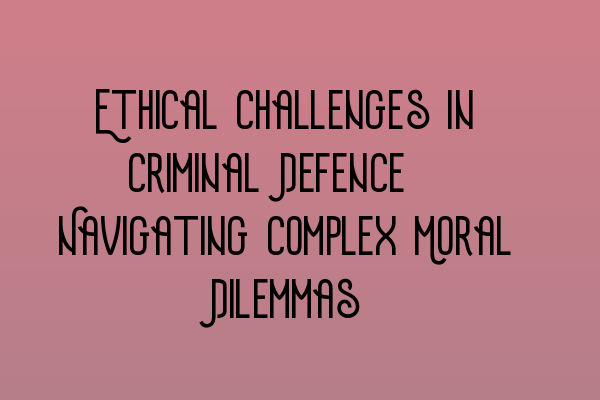Ethical Challenges in Criminal Defence: Navigating Complex Moral Dilemmas
As criminal defence solicitors, we are often faced with ethical challenges that require us to navigate complex moral dilemmas. Our duty is to represent our clients to the best of our abilities while maintaining the highest standards of professional ethics. In this blog post, we will explore some of the common ethical challenges that criminal defence lawyers encounter and discuss how we can effectively address these issues.
The Duty of Zealous Representation
One of the fundamental principles of our profession is the duty of zealous representation. We are duty-bound to advocate for our clients and present their case in the most vigorous manner possible. However, this duty can sometimes conflict with our obligation to uphold the ethical standards set by the legal profession.
In cases where our clients may be guilty of the crimes they are charged with, we are faced with the ethical challenge of balancing our duty to provide a robust defence with the knowledge that we may be defending a guilty individual. It is crucial that we handle such situations with integrity and ensure that we do not subvert the course of justice.
The Importance of Confidentiality
Another ethical challenge in criminal defence work is the need to maintain client confidentiality. Our clients must trust that the information they provide us will remain confidential and not be used against them. However, there may be instances where the information provided by our clients raises moral issues.
For example, a client could disclose information that suggests they are planning to commit a future crime or harm someone. In such cases, we face the dilemma of whether to break client confidentiality in order to prevent potential harm. This ethical challenge requires careful consideration, as we must weigh the potential harm against our duty to protect our clients’ interests.
Dealing with Difficult Clients
As criminal defence solicitors, we often encounter difficult clients with challenging personalities. These individuals may be uncooperative, disrespectful, or have conflicting agendas. It is essential to maintain professionalism and uphold ethical standards in our interactions with these clients.
One ethical challenge in dealing with difficult clients is ensuring that their interests are well-represented despite their challenging behavior. We must resist any temptation to compromise our professional ethics in order to appease the client. Our duty is to provide the best legal advice and representation, regardless of the difficult personalities involved.
Seeking Guidance and Support
Addressing ethical challenges in criminal defence requires ongoing education, self-reflection, and seeking guidance from experienced colleagues. As legal professionals, it is essential that we stay updated on any changes or updates to the SRA codes of conduct and other relevant ethical guidelines.
Seeking support from experienced colleagues or participating in SQE 1 and SQE 2 preparation courses can provide valuable insights and guidance in navigating complex ethical challenges. These courses offer comprehensive training in legal ethics and can help us develop the necessary skills and knowledge to make ethically sound decisions.
Conclusion
Ethical challenges are an inherent part of criminal defence work. As solicitors, it is our duty to recognize and navigate these challenges with professionalism, integrity, and respect for our ethical obligations. By staying informed, seeking guidance, and upholding the highest standards of professional ethics, we can effectively navigate the complex moral dilemmas that arise in our practice.
